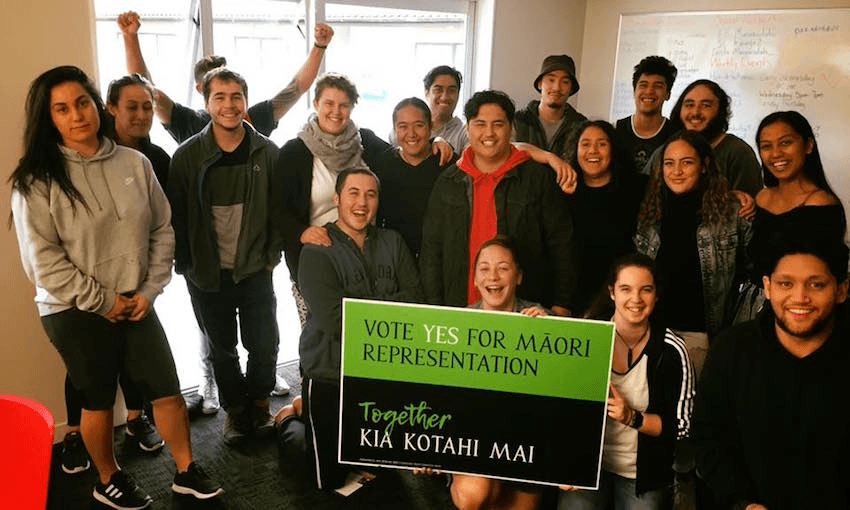If we’re serious about improving youth participation in politics, we need the Don Brashes of the world to get out of the way, writes Action Station’s Laura O’Connell Rapira.
When I was in sixth form (year 12) I was elected as the student representative on my school’s board of trustees. My primary school principal, Mr. Heff, sent me a letter of congratulations that said, “Next step, Prime Minister!”
It was lovely, as was everything Mr Heff did for us, but I remember reading it and thinking, “Ha! Yeah right. New Zealanders aren’t going to elect a wahine Māori takatāpui prime minister. Not in my lifetime anyway.”
I was 16 at the time.
And that’s the thing about representation. It’s hard for kids to believe they can grow up to be what they can’t see.
When I started high school in 2001 there were fewer than 20 Māori local government councillors around the country from a total of 1000.
By the time I finished, less than 5% of local government politicians were Māori, despite us making up 14% of the population at the time. The prime minister was (still is, and always has been) Pākehā. The mayor was (and still is) Pākehā. All of my school’s principals had been Pākehā.
In short, almost all the people I saw in positions of power in our ‘representative democracy’ didn’t much look like they represented me.
One way to rebalance this, and increase Māori representation, is to establish Māori wards.
These work a bit like the Māori seats in Parliament but for local government. They establish areas where people who choose to go on the Māori electoral roll can vote for councillors to represent them. It helps guarantee that Māori interests will have a seat at the decision-making table.
Recently, councillors in Kaikōura, Whakatāne, Western Bay of Plenty, Manawatū and Palmerston North voted to establish these wards as a way to increase Māori representation in their predominantly Pākehā councils. Things were looking up.
That was until old matey Don Brash, Hobson’s Pledge and a handful of anonymous wealthy backers crept out of the 1950s to save the status quo using an obscure, outdated and discriminatory law that enables the decision to be put to a public vote.
Here’s how it works: If a local council decides to establish Māori wards and someone from any part of the country (Don) wants to stop it, they (Don) can come along with a petition that has just 5% of the local residents’ signatures to force a public referendum. And they succeeded in every single ward mentioned above.
Now, don’t get me wrong, as the director and co-founder of two organisations that work hard to deepen people’s political engagement, I am all for increasing participatory decision making. But this law is unfair for two reasons.
- No other ward (e.g. rural) can be subject to a referendum and decided on this way; and
- The rights of a minority group should never be decided by the majority.
The referenda, which are happening Saturday 19 May, are likely to overturn the councils’ decision to establish Māori wards. Why? Because there are more Pākehā voters than Māori.
And why would we vote? Our colonial past means there is a deep, intergenerational distrust of the government that will require the healing of historic injustices and the restoration of tino rangatiratanga to truly undo. Why would we feel compelled to participate in a system that doesn’t look like us?
In 2015, 83% of the people in my hometown of New Plymouth voted against the establishment of Māori wards, but only 45% of the people actually turned up to vote.
Want to know what else sucks? The cost of each one of these referenda is a cool $50,000 – $100,000. Can you imagine what $100,000 could do for whānau in Whakatāne, where 43% of the population are Māori? We could fund a series of immersive 21st century citizenship education workshops that help young people learn about and feel their agency and political power. We could give $10,000 to each of the high schools in the region to support students with access to free mental health counselling. We could give 100 young budding entrepreneurs $1000 each to see what they can make happen with it. We could give 10 of them $10,000. The possibilities other than creating racial disharmony through a divisive public vote are virtually limitless.
The organisation I work for is currently supporting local groups in each of the five rohe to encourage people to vote yes to Māori wards. We’ve created a couple of social media videos, crowdfunded 75,000 flyers for volunteers to hand out and built this educational website. We’re doing our best to be the antidote to Hobson’s Pledge and even if we lose this vote, we know the battle for Māori representation is far from over.
One in three Māori today are under the age of 15. At last year’s election, the biggest group of registered voters on the Māori electoral roll were rangatahi aged 18-29. Everywhere you look, young Māori are stepping up as leaders on the world’s stage – in politics, music and movies.
Whether Don Brash and his cronies like it or not, the demographics of Aotearoa are changing, and so too are the politics. Who knows? Maybe one day photos of our local councillors will look more like this:
Laura O’Connell Rapira is the director of ActionStation and co-founder of RockEnrol.
